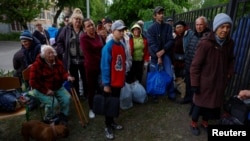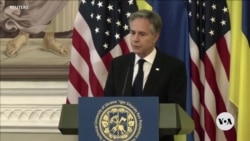United Nations humanitarian workers are calling on Russia to immediately end its armed attacks in Ukraine as the intensification of fighting in the eastern part of the country in recent days causes a surge in civilian casualties and displacement, and the destruction of critical infrastructure.
“What we are seeing on the ground is that people are being evacuated from the areas of heavy fighting or are fleeing. Now, you can imagine, for the people, for the civilians living there, this is beyond distressing,” Liz Throssell, spokesperson for the U.N. High Commissioner for Human Rights, told journalists in Geneva Tuesday.
“For many of them, it is really difficult to know what to do. Many of them really do not want to leave. That would be a question of leaving their homes, leaving their animals, leaving their plants, their gardens, a really personal kind of impact,” she said.
Russian forces have seized more Ukrainian territory and taken control of several small settlements since they launched an attack Friday near Ukraine’s second largest city, Kharkiv.
“Several waves of attacks in the Kharkiv region over the past few days have caused the death and injury of numerous civilians, including children,” said Lisa Doughten, director of financing and partnership division for the Office for the Coordination of Humanitarian Affairs, OCHA, in a briefing to the Security Council Tuesday,
“These attacks have triggered yet more displacement from border and front-line communities,” she said. “As of today, authorities report that over 7,000 civilians were evacuated from border areas of the Kharkiv region.
“And they have had devastating consequences for civilians who remain in those areas, with many cut off from access to food, medical care, electricity and gas,” she said.
The Office of the High Commissioner for Human Rights recorded more than 700 civilian casualties across Ukraine in April. The number includes at least 129 civilians who were killed and 574 injured, “the majority amid attacks by Russian armed forces along the front lines.”
While April saw a slight increase in the number of civilians who were killed compared with the previous month, the report noted that the number of injured civilians “increased significantly” for the second month in a row.
“Our human rights monitoring team in Ukraine, which is continuing to analyze information from the ground, has verified that at least eight civilians have been killed and 35 injured in the Kharkiv region since last Friday,” Throssell said, describing conditions there as dire.
“Continuing attacks on Ukraine’s energy infrastructure, which since March have affected millions across the country, have also meant daily power cuts in many parts of Kharkiv,” she said.
In April, the Human Rights Monitoring Mission in Ukraine documented 34 attacks on energy infrastructure in government-controlled territory and 13 incidents in territory occupied by the Russian Federation.
While most civilian casualties and damage to infrastructure have occurred in Ukraine-controlled territory, OCHA says that people in Russia-occupied regions of Donetsk and Sumy, in eastern and northern Ukraine, “also experienced attacks” Tuesday and over the weekend.
“Local authorities and humanitarian partners on the ground said homes and civilian infrastructure were damaged during the attacks,” OCHA said.
Between February 24, 2022, when Russia invaded Ukraine and February 24, 2024, the OHCHR reports 10,582 civilians have been killed and 19,875 injured, including 587 children who have been killed and 1,298 injured.
“These are the figures the U.N. has been able to verify. We know the true number is likely much higher,” said Regina De Dominicis, UNICEF special coordinator for the refugee and migrant response in Europe in a statement Monday.
“As we see in all wars, the reckless decisions and actions of adults are costing children their lives, safety, and futures.
“UNICEF continues to call for an immediate cease-fire in Ukraine and for all children to be protected from harm…and to end the brutal use of explosive weapons in populated areas,” she said.
In issuing this call, the UNICEF official echoed that of the OHCHR for the Russian armed forces to halt their offensive, to withdraw to internationally recognized borders, and to make every effort to avoid or “at least minimize civilian casualties when conducting their operations.”
In the meantime, OHCHR spokesperson Throssell said that the high commissioner continued to regularly engage with leaders and with permanent missions in Geneva to achieve these goals.
“We believe that it is incredibly important to keep making these calls. They may not be heeded in the first instance but as you know, part of the work of our office is to monitor, is to document as part of an overall aim of establishing accountability for violations,” she said.
While acknowledging that, in some cases, this could take years, she stressed the importance of monitoring and documenting for future accountability “what is happening in terms of human rights violations and atrocities” committed in this brutal war.





















